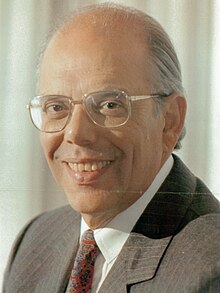
Back خورخي باتل Arabic خورخى باتل ARZ Jorge Batlle Ibáñez AST Jorge Batlle Ibáñez Catalan Jorge Batlle Ibáñez Danish Jorge Batlle German Jorge Batlle Ibáñez Esperanto Jorge Batlle Spanish Jorge Batlle Estonian Jorge Batlle Ibáñez Basque
Jorge Batlle | |
|---|---|
 Batlle in 1989 | |
| 38th President of Uruguay | |
| In office 1 March 2000 – 1 March 2005 | |
| Vice President | Luis Antonio Hierro López |
| Preceded by | Julio María Sanguinetti |
| Succeeded by | Tabaré Vázquez |
| Senator of Uruguay | |
| In office 15 February 1995 – 26 April 1999 | |
| Constituency | At-large |
| In office 15 February 1985 – 29 May 1989 | |
| Constituency | At-large |
| Representative of Uruguay | |
| In office 15 February 1959 – 15 February 1967 | |
| Constituency | Montevideo |
| Personal details | |
| Born | 25 October 1927 Montevideo, Uruguay |
| Died | 24 October 2016 (aged 88) Montevideo, Uruguay |
| Resting place | Central Cemetery of Montevideo[1] |
| Political party | Colorado Party |
| Spouses | |
| Relations | Batlle family |
| Children | Raúl Lorenzo Beatriz |
| Parent(s) | Luis Batlle Berres Matilde Ibáñez Tálice |
| Alma mater | University of the Republic |
Jorge Luis Batlle Ibáñez (Spanish pronunciation: [ˈxoɾxe ˈlwis ˈbaʝe iˈβaɲes]; Batlle locally [ˈbaʒe] or [ˈbaʃe]; 25 October 1927 – 24 October 2016) was a Uruguayan politician and lawyer, who served as the 38th president of Uruguay from 2000 to 2005. A member of the Colorado Party, he previously served as National Representative from 1959 to 1967, and as Senator of the Republic from 1985 to 1990 and from 1990 to 1999.
The eldest son of the 30th president Luis Batlle Berres and a member of the Batlle family, he was the fourth member of the family to serve as president of the country. He graduated from the University of the Republic in 1959 with a law degree, and then began a career as a journalist in El Día newspaper. He began his political career in the 1950s, being elected National Representative in the 1958 general election. During the civil-military dictatorship he was banned and in the 1984 general election that led to the democratic transition he was prevented from running for president, he could only run for the Senate.
His presidency was marked by the worsening of a banking crisis and a foot-and-mouth epidemic that affected the country's economy. Some of his initiatives consisted of the creation of the Comisión para la Paz (Spanish for 'Commission for Peace'), an investigative body on human rights with the purpose of determining the situation of those detained-disappeared during the civil-military dictatorship. In foreign policy, Batlle's government strengthened Uruguay's ties with the United States and broke diplomatic relations with Cuba.
- ^ "Así despidieron a Jorge Batlle en el Cementerio Central". El Observador. 25 October 2016. Retrieved 6 November 2016.
© MMXXIII Rich X Search. We shall prevail. All rights reserved. Rich X Search